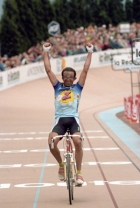Revolutions
How dynamc is cycling?

Way back in the late ‘80’s and early ‘90’s we were riding round the hills loving our Dia Compe 986’s along with the accompanying crash and burn style of riding. We were young, this was fun and we bounced. But this isn’t the way things are any more, Greg Herbold, Paul Turner, John Tomac et al came along and cycling would never be the same again. Suspension made us ride faster, and even appeared on the top step at Paris Roubaix with Gilbert Duclos-Lasalle. Disc brakes were inevitable and meant that we could stop in all conditions, ride stronger wheels which lasted longer as braking surfaces were not worn away by grit and mud. We lived the dream of cycling development, and without this mountain bike innovation revolution we wouldn’t be riding the high tech road bikes we have today.
However, as we all know, the best way to counter a revolution is to absorb it, and so mountain biking became more mainstream and 20 years later we are debating whether disc brakes are suitable for road bikes. But this isn’t a blog to berate the shortcomings of a sport’s governing body. This is about revolution.
As cyclists we know that we are explorers, innovators, free thinkers, we escape the traffic ridden cities and freshen our brains with the wind and rain, endorphins and serotonin. Let’s take this most powerful resource and use it for the change that we know has to come.
The change that we are looking for is cultural, political, for ourselves and for society at large.
Not so long ago you could smoke in pubs and restaurants, but in a few short years this has become a social anathema, and handily represents how quickly society can change. This must be the future of cycling.
After countless cycling deaths of late we see political diversion, polemics and general stale thinking infesting us with a car/cycle war but notably no progress. When the issue becomes headphones over fatalities the issue in fact becomes disrespect. This is political middle ground manoeuvring of the boring and unimaginative school of thought to which we have become, unfortunately, accustomed. A case in point is the local politician who recently appeared at a cycle pressure group meeting without having even read the manifesto or taken time to understand the ideas. This is typical of the laziness, disrespect, lack of political will, lack of vision and lack of intelligence to which we are resigned.
The creation of this car/bike ‘war’ is purely a case of divide and conquer, when in fact the motorist and the cyclist share a common goal and a common solution. Motorists do not want to kill cyclists. Cyclists do not want to be killed by motorists. In no instance does a fatality become anything other than a tragic, unacceptable and destructive outcome.
The only solution for this is change at a national level, where the cyclist and the motorist are treated as equal members of society. Choice of transport is, more often than not, a case of habit and necessity, not a political statement. Drivers are cyclists, and vice versa.
As a driver the issue is frustration. The road network is not suited to the volume of traffic it is forced to bear and the outcome is aggravation and aggression. Cars in queues are pressurised stress containers. Seeing cyclists break the law serves to enhance this pressure. Deflection of the failure of politicians on to the shoulders of 10% (source: The Times) of cyclists is a low cost option for successive governments failing society. Surely every time a member of government sits in traffic they should see it as an expression of their failure and feel ashamed.
As cyclist the issue is danger. The rush of adrenalin that is caused by too many near death experiences. Whether the bike is used as transport or for leisure, it is supposed to be life enhancing not life threatening.
As members of society both cyclists and drivers are required to obey the law. Being angry that motorists don’t like cyclists jumping lights, riding unlit at night, navigating one-way systems in reverse, is absurd. Being annoyed that cyclists are permitted in the highway code to ride two abreast, or may be traveling at a slower speed than you is equally ridiculous. But, to reiterate, the solution is the same and until this solution is delivered, by those whom we employ to deliver it, the problem naturally continues to exist.
We know that the solution is a valid cycle network, with segregated and useable provisions, as identified previously elsewhere! It has not escaped the notice of the motorist that it is possible to drive to a city on a route unimpeded by towns and unsuitable roads, and find a vast expanse of space in which to securely leave their car, maybe have it cleaned, or fueled or serviced. Where in the UK is this possible for the cyclist?
How can we expect cycling as a viable form of transport to become an option for all members of society until there is a similar provision? This is not an issue of national security, it’s an issue of national sanity, and so should incur a suitable budget at the highest level, not a token payment at the lowest level. Forget aggravation, promote education. Smoking in restaurants, not wearing a seat belt, drink driving, racism, slavery, a flat earth - all nonsense, all changed through education. Let’s believe in the same for cycling. Expect respect from your politician. You pay for your roads, whether cyclist or driver, it’s just that the product is not being delivered for the cycling part of your life.
Assimilate the cycling revolution.
